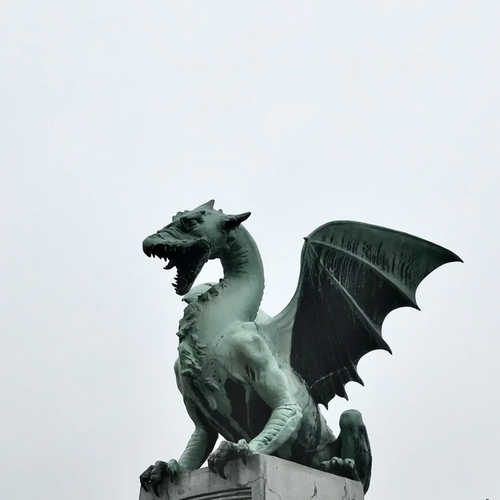A Name Deserved
The Voyage of the Dawn Treader begins with the memorable line, “There once was a boy named Eustace Clarence Scrubb, and he almost deserved it.” And while he almost deserved that name, there was something that he most certainly did not deserve—grace. But that was exactly what he got.
He was a miserable boy who only read the wrong sorts of books. He knew lots about exports and imports and governments but very little about dragons. He was sulky, moody, and disagreeable. It wasn’t so much that no one liked him—though it was definitely hard to like him—it was that he didn’t much like anyone else.
And he remained that way, ugly and unchanged; that is, until Aslan changed him. I want to tell you about how that happened.
He was a miserable boy who only read the wrong sorts of books. He knew lots about exports and imports and governments but very little about dragons. He was sulky, moody, and disagreeable. It wasn’t so much that no one liked him—though it was definitely hard to like him—it was that he didn’t much like anyone else.
And he remained that way, ugly and unchanged; that is, until Aslan changed him. I want to tell you about how that happened.

The Story of Eustace
At one point in the story, Eustace found himself alone in a dark valley with a decrepit and dying dragon. Fortunately for him, the dragon didn’t notice him, hobbled to a nearby pool for a drink of water, and died without a fight. Swelling with misplaced pride at his so-called victory, Eustace took shelter in the dragon’s lair and contemplated all the things he planned to selfishly do with his newly-acquired dragon wealth. He thought dragonish thoughts. He fell asleep. And then, unironically, he awoke a dragon.
The point is not to belabor all that he did while he was a dragon, the point is to explain how he became un-dragoned.
The experience of being a dragon eventually made Eustace come to his senses and realize how miserable of a person that he truly was. It was at this point when a huge lion approached him. The lion beckoned him to follow him up the mountain to a garden and told him to undress—and terrified, Eustace obeyed.
At first, he tried to use his dragon claws to scratch off his scaly skin. But after several molts were removed, there was always a new layer of skin underneath. In his own power, Eustace found he was powerless to get his dragon skin off. As one author has said, “As long as Eustace was doing his own scraping, it would be dragon skins all the way down.” Eustace recalls…
“Then the lion said—but I don’t know if it spoke—‘You will have to let me undress you.’ I was afraid of his claws, I can tell you, but I was pretty nearly desperate now. So I just lay flat down on my back to let him do it. The very first tear he made was so deep that I thought it had gone right into my heart. And when he began pulling the skin off, it hurt worse than anything I’ve ever felt. The only thing that made me able to bear it was just the pleasure of feeling the stuff peel off” (pg. 109).
Only the lion was able to remove the dragon skin. It was incredibly painful for Eustace, but the pain was entirely necessary. Because of it, he was no longer a dragon. And after a cool bath and a new set of clothes, he was just Eustace again—but a changed boy, a new man.
After Eustace retells the story of his encounter with the lion to Edmund, Edmund tells him that the lion must have been Aslan. Eustace responds by saying, “But who is Aslan? Do you know him?” And Edmund says, “Well—he knows me… He is the great Lion, the son of the Emperor-beyond-the-Sea, who saved me and saved Narnia” (pg. 111).
The point is not to belabor all that he did while he was a dragon, the point is to explain how he became un-dragoned.
The experience of being a dragon eventually made Eustace come to his senses and realize how miserable of a person that he truly was. It was at this point when a huge lion approached him. The lion beckoned him to follow him up the mountain to a garden and told him to undress—and terrified, Eustace obeyed.
At first, he tried to use his dragon claws to scratch off his scaly skin. But after several molts were removed, there was always a new layer of skin underneath. In his own power, Eustace found he was powerless to get his dragon skin off. As one author has said, “As long as Eustace was doing his own scraping, it would be dragon skins all the way down.” Eustace recalls…
“Then the lion said—but I don’t know if it spoke—‘You will have to let me undress you.’ I was afraid of his claws, I can tell you, but I was pretty nearly desperate now. So I just lay flat down on my back to let him do it. The very first tear he made was so deep that I thought it had gone right into my heart. And when he began pulling the skin off, it hurt worse than anything I’ve ever felt. The only thing that made me able to bear it was just the pleasure of feeling the stuff peel off” (pg. 109).
Only the lion was able to remove the dragon skin. It was incredibly painful for Eustace, but the pain was entirely necessary. Because of it, he was no longer a dragon. And after a cool bath and a new set of clothes, he was just Eustace again—but a changed boy, a new man.
After Eustace retells the story of his encounter with the lion to Edmund, Edmund tells him that the lion must have been Aslan. Eustace responds by saying, “But who is Aslan? Do you know him?” And Edmund says, “Well—he knows me… He is the great Lion, the son of the Emperor-beyond-the-Sea, who saved me and saved Narnia” (pg. 111).
The Story of Us
What is amazing is that the story of Eustace is the story of each one of us. Helplessly miserable, sinful, and poor. Unworthy to receive grace and favor from God. Unable to save ourselves in our own power.
But, as Christians, our testimonies are all the same. We can say, “God knows me. God saved me. God is changing me. And I do not deserve any of it one bit.” In fact, all we deserve is the name Sinner.
Ephesians 2:1-10 says:
And you were dead in the trespasses and sins in which you once walked, following the course of this world, following the prince of the power of the air, the spirit that is now at work in the sons of disobedience— among whom we all once lived in the passions of our flesh, carrying out the desires of the body and the mind, and were by nature children of wrath, like the rest of mankind. But God, being rich in mercy, because of the great love with which he loved us, even when we were dead in our trespasses, made us alive together with Christ—by grace you have been saved— and raised us up with him and seated us with him in the heavenly places in Christ Jesus, so that in the coming ages he might show the immeasurable riches of his grace in kindness toward us in Christ Jesus. For by grace you have been saved through faith. And this is not your own doing; it is the gift of God, not a result of works, so that no one may boast. For we are his workmanship, created in Christ Jesus for good works, which God prepared beforehand, that we should walk in them.
But God. Perhaps the two most comforting words in the whole Bible. God made us alive. God undressed us so that he could dress us up. God took our filthy, unrighteous rags and gave us his pure, righteous robes. The process wasn’t always painless or pretty, but it was necessary. He had to first unmake us so that he could remake us after his image.
And what’s humbling about all of this is that he’s not done yet. Lewis writes about Eustace near the end of the chapter…
“It would be nice, and fairly nearly true, to say that ‘from that time forth Eustace was a different boy.’ To be strictly accurate, he began to be a different boy. He had relapses. There were still many days when he could be very tiresome. But most of those I shall not notice. The cure had begun” (pg. 112).
Isn’t that true of us too? We still sin and falter at times. We haven’t yet stepped across those eternal shores where there is no more death, and crying, and tears, and sin, and struggle. But take heart, for those who are in Christ Jesus, the cure has begun.
But, as Christians, our testimonies are all the same. We can say, “God knows me. God saved me. God is changing me. And I do not deserve any of it one bit.” In fact, all we deserve is the name Sinner.
Ephesians 2:1-10 says:
And you were dead in the trespasses and sins in which you once walked, following the course of this world, following the prince of the power of the air, the spirit that is now at work in the sons of disobedience— among whom we all once lived in the passions of our flesh, carrying out the desires of the body and the mind, and were by nature children of wrath, like the rest of mankind. But God, being rich in mercy, because of the great love with which he loved us, even when we were dead in our trespasses, made us alive together with Christ—by grace you have been saved— and raised us up with him and seated us with him in the heavenly places in Christ Jesus, so that in the coming ages he might show the immeasurable riches of his grace in kindness toward us in Christ Jesus. For by grace you have been saved through faith. And this is not your own doing; it is the gift of God, not a result of works, so that no one may boast. For we are his workmanship, created in Christ Jesus for good works, which God prepared beforehand, that we should walk in them.
But God. Perhaps the two most comforting words in the whole Bible. God made us alive. God undressed us so that he could dress us up. God took our filthy, unrighteous rags and gave us his pure, righteous robes. The process wasn’t always painless or pretty, but it was necessary. He had to first unmake us so that he could remake us after his image.
And what’s humbling about all of this is that he’s not done yet. Lewis writes about Eustace near the end of the chapter…
“It would be nice, and fairly nearly true, to say that ‘from that time forth Eustace was a different boy.’ To be strictly accurate, he began to be a different boy. He had relapses. There were still many days when he could be very tiresome. But most of those I shall not notice. The cure had begun” (pg. 112).
Isn’t that true of us too? We still sin and falter at times. We haven’t yet stepped across those eternal shores where there is no more death, and crying, and tears, and sin, and struggle. But take heart, for those who are in Christ Jesus, the cure has begun.
Logan Thune
Recent
Archive
2025
2024
January
February
April
June
2023
August
September
Categories
no categories
